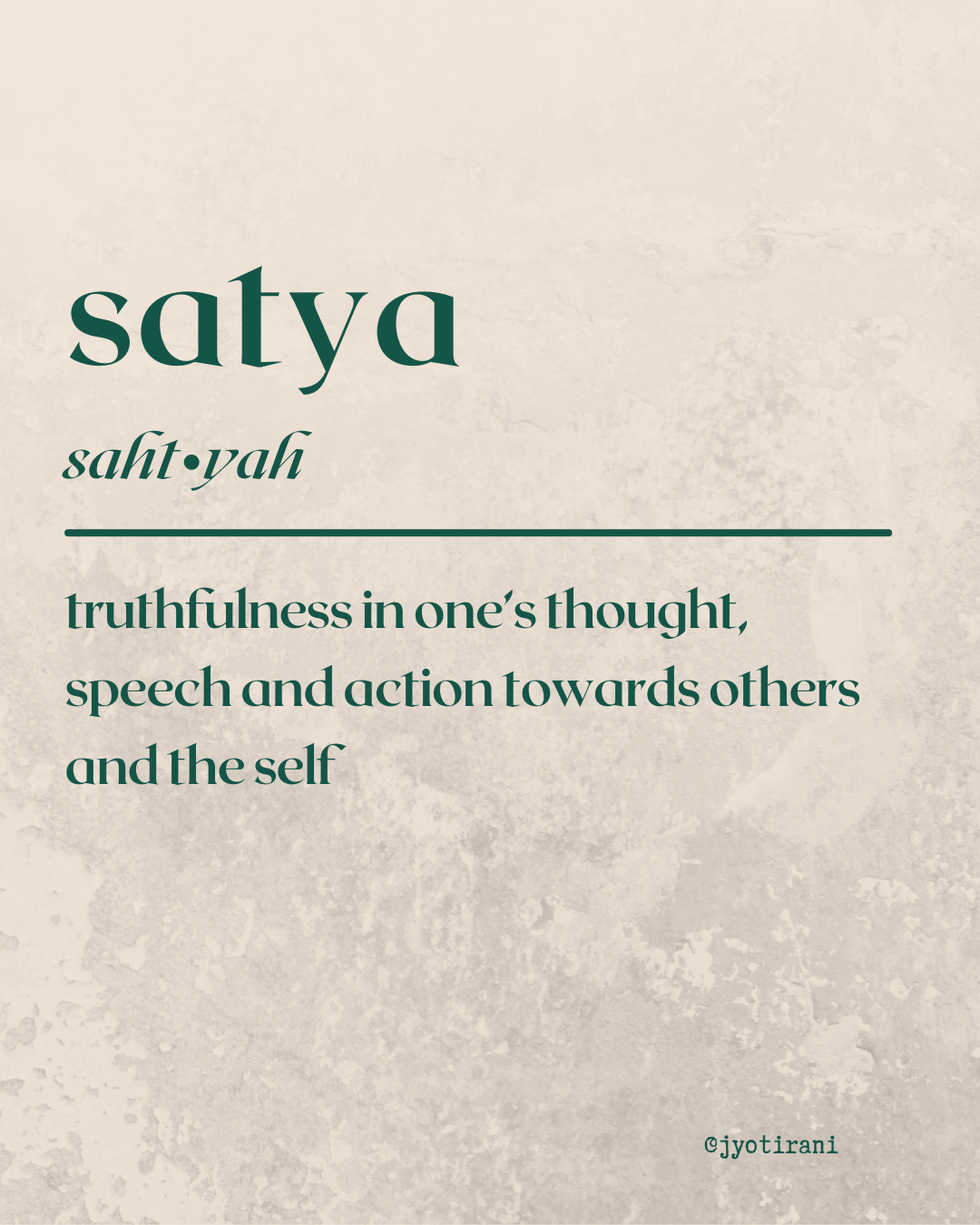The Yamas: A Deeper Look At Satya
From a young age we are taught not to lie. We are taught the importance of truth. As children we only speak the truth and as a primary school teacher I can vouch for the fact that young children are brutally honest - they do not hold back. As we grow older we learn that there is this grey area between truth and lies. Suddenly it becomes okay to lie or to bend the truth. There are some truths that we hide from others for fear of hurting their feelings. There are some lies that we tell to protect ourselves or others. Slowly we stop being so honest with others and, as a result, ourselves. We can get lost in a web of lies. We can lose our own truth and our essence as we conform to societal norms and attempt to fit into the boxes laid out for us. We start to wonder what if? We start to become restless. So how do we overcome this? How can we find our way back to our truth? And what does yogic philosophy have to say about truth?
Our next yama is satya (saht-yah) which means truthfulness. The root word ‘sat’ means 'true essence' or 'true nature'. It refers to that which is unchangeable. As with most Sanskrit words, there is more to satya than meets the eye. It is not simply about telling the truth or not lying. So let’s unpack this principle and see how we can apply it into our lives.
Since all of the yamas build upon each other, we must act with ahimsa (non-violence) towards ourselves and others. Are you an honest person? When was the last time you told a lie and why? Do you show your true self to the people around you? Are you honest with yourself?
Take some time to sit with these questions. You may even want to journal around them and see what comes up. Chances are these questions will make you feel a range of emotions. No one wants to be called a liar or to think of themselves as a dishonest person. Yet in reality we are all dishonest to some extent, whether to ourselves, others or both. We live in a society dripping with lies and deceit, a society that hides things and covers things up. Many of us are terrified of being vulnerable, showing our true selves and putting ourselves out there. The fear of rejection or what others will think holds us back. It paralyses us. It keeps us stuck.
Now we all have parts of ourselves that we are not so proud of - we try to hide them from others and deny them to ourselves. They are sometimes referred to as our shadows. Where do you need to shine a light on your shadows?
Try the following journaling exercise using free writing. This simply means relinquishing control and writing whatever comes into your mind without filtering or editing. Writing as though no one will read it and letting it flow on to the page.
Bring someone to your mind who you are not particularly fond of
Consider the qualities about them that you dislike the most
Now think about those same qualities within yourself. When have you displayed those qualities? What were the circumstances? Why did you behave that way? What was the gift in behaving that way?
Often, the things we dislike the most about others are the parts of ourselves that we dislike the most - our shadows, the parts of us we deny and try to keep hidden
We all make mistakes. We all get angry. We all get embarrassed. We all say things we wish we hadn’t. We all act in ways that we aren’t proud of. Instead of repressing these emotions and blaming others, let's start to take responsibility for the part we play, learn from it and break the cycle. Through shining a light on our shadows, acknowledging them and accepting them we can get honest with ourselves and have more compassion for others.
As I mentioned earlier, satya refers to truths that do not change. With this in mind it’s easy to see how we don’t actually see the truth that is in front of us. Our reality is clouded by our emotions, feelings, judgement and past experiences. How can our emotions or feelings be the truth if they are always changing? That’s not to say that we disregard them and don’t listen to them. Rather we learn how they work. We learn what they are showing us. We learn when they are serving us and when they are holding us back. We learn when they are showing us the truth and when they are lying to us. We learn how to honour them whilst staying grounded in our true essence.
When we act based solely on our feelings or emotions it can lead to us reacting and behaving irrationally. We use our primal instincts which are useful when we are in danger but not in day-to-day situations since we act from a place of fear and conditioning. Rather, through our yoga practice we learn to become an observer and respond rather than react. Through pranayama, asana and meditation we can create space between ourselves and the event. In this space we see things rationally and can respond from a grounded and calm place. This space is our true nature. This space is where we aim to live in and respond from. Of course, this takes practice. A lot of practice. It is not an overnight fix.Through our yoga practice we slowly spend more and more time in this space and come back to our truth. We come back home to ourselves.
With love and gratitude,
Jyoti x
(pronounced Jyoh-thee)
Article written for Ekotex Yoga ~ visit www.ekotexyoga.com to see more and save 10% with my code 'JYOTIRANI'

